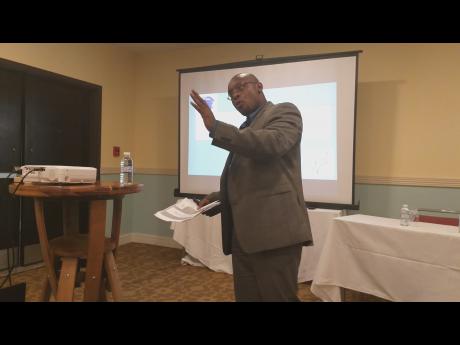Ainsley Brown | EXED postgrad students on the cutting edge with logistics projects (Part I) - Logistics-centred economy, Jamaica's response to the Fourth Industrial Revolution
"Don't tell people how to do things. Tell them what to do and let them surprise you with their results."
- US General George S. Patton
As a teacher, I like to stretch my students. I like to push them to their limits so that they can define and redefine what is possible and what success means to them. I believe it is my responsibility as an educator to get my students ready to not only thrive, but to equip them with the skills and mindset to be able to shape the world in which they live.
This personal mission has become all the more pressing with the rapid technological changes under way as the Fourth Industrial Revolution takes shape and gathers momentum in both scale and scope.
This article is written as a tribute to my students, a testament to their capacity to learn, their capacity to take that learning and transform it into meaningful action, and their capacity to shape their individual futures as well as the collective future of this country, Jamaica land we love.
Deciding to teach, albeit part time, has been one of the most rewarding experiences of my life.
I vowed long ago that if I ever had the privilege to teach, I would do two things:
1. Explain to students the real-world application of what they were studying;
2. Give them something extra. What that extra was I did not know, but knew I had to do it as part of my community service. In this case it was the gift of digital storytelling, but more on that later.
Well, opportunity came knocking and I answered: the post- grad logistics programme at the School of Business and Entrepreneurial Studies at Excelsior Community College.
I will admit that teaching is not my profession, but it is a deeply held passion. Another passion of mine is Jamaica's development into a logistics-centred economy. And that allows me to combine both passions, each being mutually reinforcing.
In working, collaborating, and learning with and from my students, we are literally doing what it takes, albeit in our own small way, to transform the Jamaican economy into a logistics-centred one.
My Students
These students, my students, were the victims, or should I say, the victors of this personal mission.
These intrepid souls are all young professionals who, for either professional or personal reasons, decided to up-skill their knowledge and skill sets in the area of logistics. And even with my biased view, I think they made the right choice. Logistics - the careful organisation of a complicated activity so that it happens in a successful and effective way (Cambridge Dictionary) - after all, is the glue that keeps our globalised world together. For all but a few of the students, logistics and supply-chain management was a whole new subject area.
They are simply great students! A teacher could not hope for a better group of students. And as much as I stretched them, they equally have pushed me to be better.
And for that I must tell them a special THANK YOU!
I firmly believe that logistics matter. I would go one step further and say that I believe that Jamaica's move to transform its economy into a logistics-centred one is a clear response to the challenges and opportunities presented by the Fourth Industrial Revolution.
Why do I think so?
Professor Klaus Schwab, founder and executive chairman of the World Economic Forum, explains the Fourth Industrial Revolution in this way:
The First Industrial Revolution used water and steam power to mechanise production. The Second used electric power to create mass production. The Third used electronics and information technology to automate production. Now a Fourth Industrial Revolution is building on the third, the digital revolution that has been occurring since the middle of the last century. It is characterised by a fusion of technologies that is blurring the lines between the physical, digital, and biological spheres.
If I had to boil the Fourth Industrial Revolution down to its basics, I would say it consists of three things:
1. Connectivity: Connectivity in the Fourth Industrial Revolution is about relationships. That is to say, the relationships "between people-people, people-things, and things-things." (Forbes)
2. Flows: Flows are movement of goods, services, people, data, and money that characterise global commerce. "This isn't complicated," as Tom Friedman, who wrote in his book, Thank You for Being Late: An Optimist's Guide to Thriving in the Age of Accelerations, puts it: "The most educated people who plug into the most flows and enjoy the best governance and infrastructure win."
3. Management of connectivity and flows: The management of connectivity and flows is where I get the most exicited as this is where the glue of global trade - logistics - plays its part in the Fourth Industrial Revolution.
Competitiveness in our globalised world is increasingly based on one's ability to understand, connect, and manoeuvre within and among the various networks that make the world work. The Logistics Performance Index 2014 put it succinctly: "Improving logistics performance is at the core of the economic growth and competitiveness agenda."
Therefore, Jamaica's Global Logistics Hub Initiative is Jamaica's response for building a competitive, resilient, and sustainable nation in the era of the Fourth Industrial Revolution.
In Part Two, we explore one skill that is as ancient as humanity that is unexpectedly preparing students for the 21st century and the future of work in the Fourth Industrial Revolution.
- Ainsley Brown is the regulatory, trade, and monitoring director at Jamaica's Special Economic Zone Authority and an adjunct lecturer at the Caribbean Maritime Institute and Excelsior Community College.


